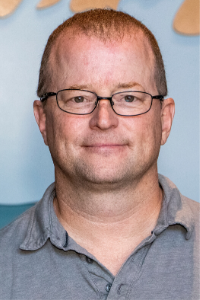
Meet Maine-eDNA: Graham Sherwood, Research Scientist, GMRI
 Graham Sherwood received his undergraduate degree in Biology and Environmental Studies. During the course of his education, he found field work interesting and took a specific liking to freshwater ecology. He completed an internship working on fish ecology and food webs, which eventually led to a Masters degree in Ecology. He studied how altered food webs can change fish productivity and the way fish respond to such changes. This rolled into his Ph.D. research and then his postdoctoral studies in Newfoundland, where he studied the massive collapse of the cod fishery there.
Graham Sherwood received his undergraduate degree in Biology and Environmental Studies. During the course of his education, he found field work interesting and took a specific liking to freshwater ecology. He completed an internship working on fish ecology and food webs, which eventually led to a Masters degree in Ecology. He studied how altered food webs can change fish productivity and the way fish respond to such changes. This rolled into his Ph.D. research and then his postdoctoral studies in Newfoundland, where he studied the massive collapse of the cod fishery there.
Now, Sherwood is a research scientist specializing in fisheries ecology for the Gulf of Maine Research Institute (GMRI). Over the years, he’s done a lot of work with commercial offshore fisheries, including haddock, herring, and monkfish. He’s also done work with inshore monitoring and food webs, specifically focusing on the impact of the reintroduction of alewives on nearshore fish communities.
Sherwood is also working with Maine-eDNA, a five-year, $20 million program funded by NSF EPSCoR. The program is a “state-wide, multi-institutional initiative establishing Maine as a national leader in environmental monitoring, ecological understanding and sustainability of coastal ecosystems through research, education, and outreach.” According to Sherwood, incorporating environmental DNA (eDNA) into food web and fisheries research is revolutionary.
“My work is mostly based on calibrating eDNA techniques using some of our existing surveys as comparisons,” Sherwood explains. He will be collaborating with other Maine-eDNA researchers, such as program Co-PI Michael Kinnison (UMaine), Kristina Cammen (UMaine), and Karen Wilson (USM). His work so far has established ties with each of the three thematic goals on the program: sustainable fisheries, harmful and shifting species, and macrosystem eDNA integration.
Sherwood has used a variety of techniques over the years in order to track and quantify specific aquatic species. These include acoustic surveys, which can detect the abundance of target species using acoustic detectors in order to estimate the distribution and biomass of species living in open water.
“We’ve done so much of this type of work that we’re pretty accurate at identifying specific species and their abundance,” Sherwood says. “That’s why we’re confident in our ability to validate the offshore eDNA testing in order to better understand how it works and how we can establish specific protocols that promote best testing scenarios.”
According to Sherwood, some species are notoriously difficult to sample, and require a high investment in trial surveys. Most surveys are limited by a whole host of factors, such as weather. In addition, certain habitats, such as sand, mud, gravel, and ledges, can also be difficult to navigate. The eDNA testing requires only a sample of water, which makes it an ideal testing method in these types of scenarios.
“With eDNA sampling, you don’t need to extract the fish to know what lives there. You just take a sample around the structure or habitat and are able to say something about what is living there,” Sherwood says.
In the first year of work, Sherwood has been able to help establish policies and practices that apply to field work and has also been involved with discussions regarding which testing sites the program should focus on.
“What’s really interesting about Maine-eDNA is the focus on student involvement,” Sherwood adds. “The graduate students taking part in this are going to have a great experience, and seeing how all of these resulting graduate projects will interact with each other is very exciting.” Sherwood is co-advising one such graduate student, Zachary May.
“We’re excited about starting this project,” Sherwood says. GMRI was given the green light earlier in summer 2020 to conduct field work with specific safety guidelines in response to the COVID-19 pandemic. “We’ve gotten our feet wet with water sampling for eDNA,” Sherwood adds. “And I’ve got a feeling it will be a game changer for us.”
